Gouda Cheese: A Foodie’s Guide to the World’s Most Beloved Cheese
If you’re a cheese lover, you’ve likely encountered Gouda on a cheese board, in recipes, or simply paired with your favorite drink. It’s versatile, flavorful, and packed with personality. But what makes Gouda so special? From its rich history to its modern-day uses, this guide explores everything you need to know about Gouda, offering insight into its making, varieties, pairings, and beyond. By the end, you’ll be inspired to try (or rediscover) this timeless classic in new and exciting ways.
Table of Contents
A Brief History of Gouda Cheese
Named after the city of Gouda in the Netherlands, this iconic cheese dates back to the 12th century. However, it’s important to note that Gouda wasn’t made exclusively in Gouda. Farmers all over the surrounding region crafted it, but Gouda became famous as the city where markets negotiated its trade. Even today, historical cheese markets in Gouda draw visitors from around the globe, celebrating centuries-old traditions.
What truly sets Gouda apart is its time-honored production process. Crafted from cow’s milk (with some varieties using goat’s or sheep’s milk), the curds are washed to reduce acidity, creating the perfect conditions for its distinctively sweet and mild flavor. After pressing, brining, and coating the wheel in wax for preservation, Gouda is aged to develop its complex taste—ranging from buttery and mild when young to rich and nutty when aged.
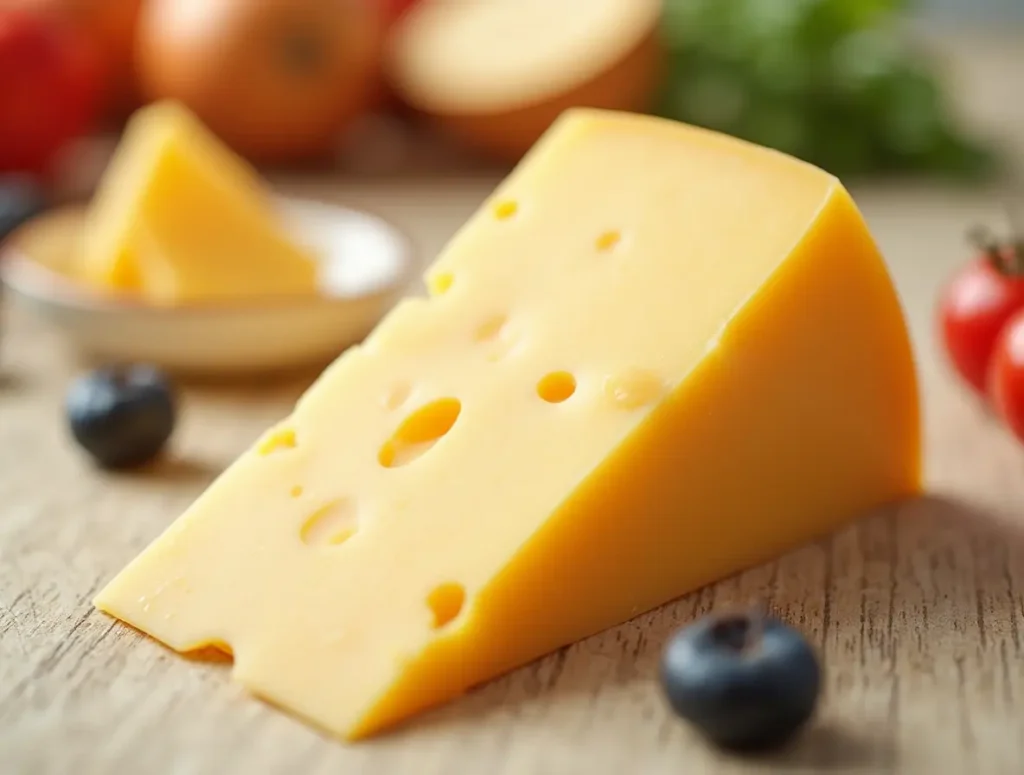
The Art Behind Gouda Cheese-Making
Making Gouda is nothing short of an art form. Each wheel begins with fresh milk and a perfect balance of rennet and cultures. The milk is heated, allowing curds to form. The curds are carefully cut and washed—a step that reduces lactic acid, creating Gouda’s creamy, slightly sweet profile.
The pressed curds are then molded into familiar round wheels, then soaked in a brine bath. This step enhances flavor and acts as a natural preservative. Traditionally, Gouda is coated in yellow or red wax to lock in moisture during the aging process and protect its texture.
But the magic happens during aging (known as affinage). Depending on how long the cheese is matured, its flavor changes dramatically. Gouda aged for just a few weeks is soft and delicate, while aged Gouda, often called “Boerenkaas” when produced on Dutch farms, is crumbly, robust, and deeply caramelized.

Exploring Gouda Varieties
Not all Gouda is created equal. The flavor and texture spectrum of Gouda make it incredibly versatile, appealing to various tastes and culinary needs.
Young Gouda (Jong Gouda)
Young Gouda is aged for about 4-8 weeks and is buttery with a mild sweetness. It melts beautifully, making it ideal for grilled cheese sandwiches, sauces, or as a snack. Pair it with fresh fruit or crusty bread for the perfect afternoon pick-me-up.
Aged Gouda (Oude Gouda)
Aged Gouda undergoes at least 12 months of maturation (or even longer, up to several years). The aging brings out crystal-like crunches and rich, bold flavors of butterscotch or caramel. Whether grated over pasta, paired with dark chocolate, or enjoyed with a full-bodied red wine, aged Gouda is a true sensory experience.
Smoked Gouda
Another popular favorite is smoked Gouda, known for its savory, slightly smoky flavor, achieved naturally or with smoke-infused ingredients. It elevates dishes like mac and cheese, burgers, and even breakfast sandwiches.
Gouda Around the Globe
While the Netherlands is Gouda’s birthplace, its popularity has inspired cheesemakers worldwide. Regions like Wisconsin in the United States, Canada, and New Zealand now produce high-quality Gouda varieties, often introducing local twists based on unique milk sources and aging techniques.
For instance, North American Goudas tend to offer a creamier texture, while European versions maintain their traditional nuttiness. Trying Gouda from different regions is like embarking on a global cheese-tasting adventure!
Why Gouda is Good for You
Beyond its irresistible taste, Gouda offers a surprising number of health benefits. It’s rich in calcium, protein, and vitamin K2—essential for bone health and cardiovascular support. Aged Gouda is also naturally lower in lactose, making it a better option for individuals with lactose sensitivities.
However, as Gouda is relatively high in fat, moderation is key. Pairing it with fiber-rich snacks, like fruits or vegetables, can create a balanced treat.
Here’s a detailed table of the nutritional components for Gouda Cheese (per 100 grams):
| Nutrient | Amount | % Daily Value (Approx.) |
|---|---|---|
| Calories | 356 kcal | 18% |
| Total Fat | 27.4 g | 42% |
| – Saturated Fat | 17.6 g | 88% |
| – Trans Fat | 0.9 g | — |
| Cholesterol | 114 mg | 38% |
| Sodium | 819 mg | 34% |
| Total Carbohydrates | 2.2 g | 1% |
| – Dietary Fiber | 0 g | 0% |
| – Sugars | 0 g | — |
| Protein | 25 g | 50% |
| Calcium | 700 mg | 54% |
| Iron | 0.2 mg | 1% |
| Vitamin A | 200 mcg | 22% |
| Vitamin D | 0.3 mcg | 2% |
| Vitamin B12 | 1.7 mcg | 71% |
| Magnesium | 27 mg | 6% |
| Phosphorus | 550 mg | 44% |
| Potassium | 93 mg | 3% |
| Zinc | 3.9 mg | 35% |
Notes:
- % Daily Value is based on a 2,000-calorie diet. Adjustments may be needed based on individual dietary requirements.
- Values may vary slightly depending on the brand or specific type of Gouda cheese.
Culinary Inspirations with Gouda
The culinary possibilities with Gouda are endless. Its creamy texture makes it perfect for melting, while its aged form holds up beautifully when grated or crumbled. Here are some ideas to get you started:
- Gouda-Stuffed Burgers: Add a creamy burst of flavor by stuffing ground beef patties with smoked Gouda.
- Gouda and Mushroom Risotto: Swap Parmesan for Gouda to create a velvety, decadent twist.
- Gouda Apple Tarts: Pair aged Gouda’s caramel notes with sweet apples in a flaky tart.
Whether it’s folded into savory dishes or paired with sweet ingredients, Gouda’s versatility shines.
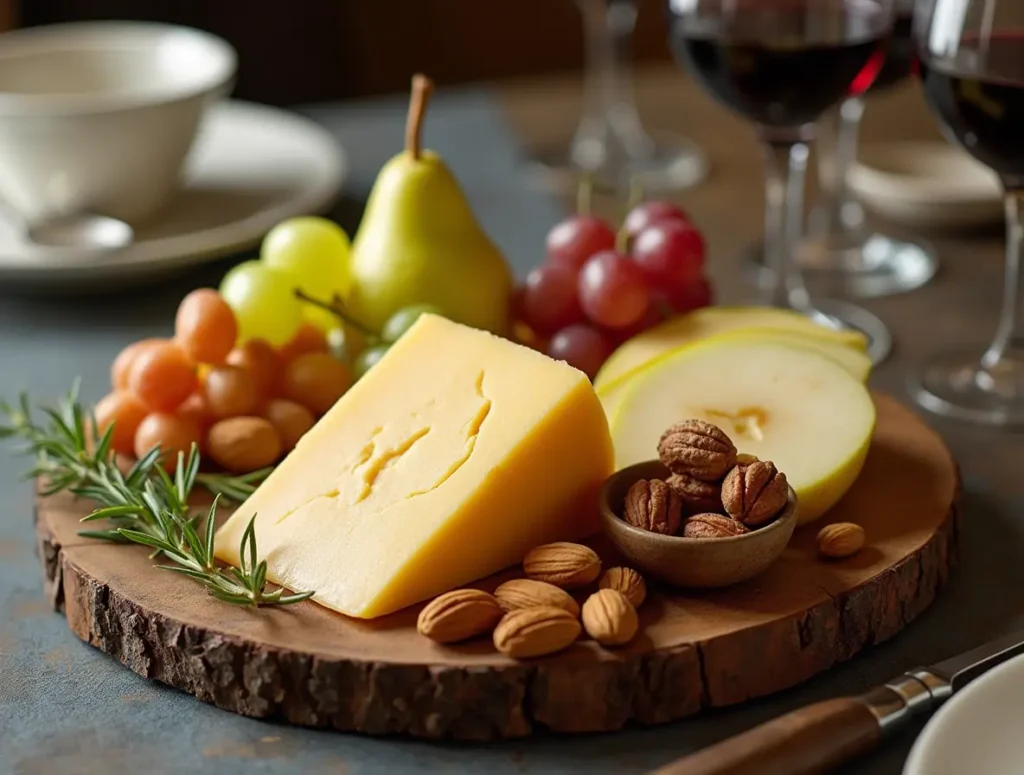
Pairing Gouda Like a Pro
For an elevated dining experience, pair your Gouda thoughtfully. Here are some winning combinations to try:
- Fruit and Nuts: Pair fresh slices with apples, pears, almonds, or walnuts to highlight its sweet undertones.
For the ultimate party centerpiece, build a Gouda cheese board with crackers, honey, and dried figs.
Buying and Storing Gouda
When shopping for Gouda, look for a firm yet smooth texture, vibrant color, and a fresh aroma. Visit your local artisan cheese shop or markets for authentic, high-quality selections.
To store Gouda, wrap it in parchment or wax paper and place it in an airtight container in the refrigerator. Keep it away from freezing temperatures, as this compromises its texture. Properly stored, young Gouda lasts up to 2 weeks, while aged Gouda can stay good for several months.
Unlock Gouda’s Full Potential
Gouda cheese is more than just a foodie staple—it’s a celebration of history, flavor, and tradition. Whether you’re enjoying a classic young Gouda sandwich, experimenting with smoky flavors in recipes, or savoring aged Gouda with a glass of wine, this cheese always leaves an impression.
Want to keep the Gouda goodness going? Join our cheese-loving community for expert tips, recipes, and more. Share your Gouda adventures; we’d love to see how you enjoy this versatile gem.
FAQ
What is Gouda cheese made from?
Gouda cheese is traditionally made from cow’s milk, though some variations use goat or sheep milk. Its production involves curdling the milk, draining the whey, and pressing the curds into molds before a meticulous aging process begins.
How should I store Gouda cheese?
To keep Gouda fresh, wrap it in wax paper or parchment paper and store it in an airtight container in the refrigerator. Avoid plastic wraps as they can trap moisture and affect the cheese’s flavor.
Can I freeze Gouda cheese?
Yes, Gouda cheese can be frozen, but it may change texture once defrosted. It is best to freeze only for cooking purposes, as the creamy, rich texture might be altered.
What pairs well with Gouda cheese?
Gouda cheese pairs wonderfully with fruits like apples and pears, as well as nuts, honey, and a variety of wines including Chardonnay and Merlot. Its versatility also makes it a great addition to sandwiches, soups, and casseroles.
Is Gouda cheese lactose-free?
Aged Gouda is typically very low in lactose, making it a good option for those with lactose sensitivities. The aging process breaks down most of the lactose in the cheese.
For more questions or tips, feel free to reach out—we’re happy to help enhance your Gouda experience!

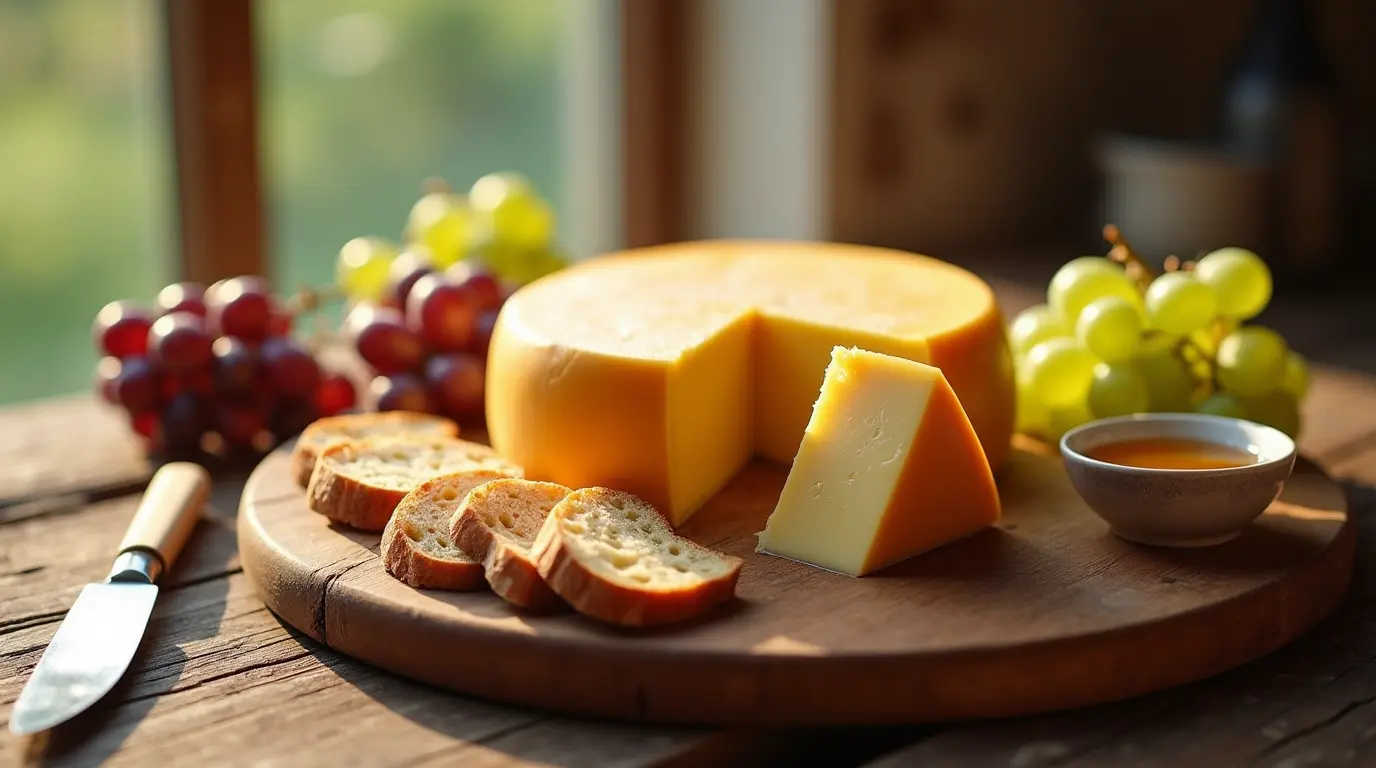
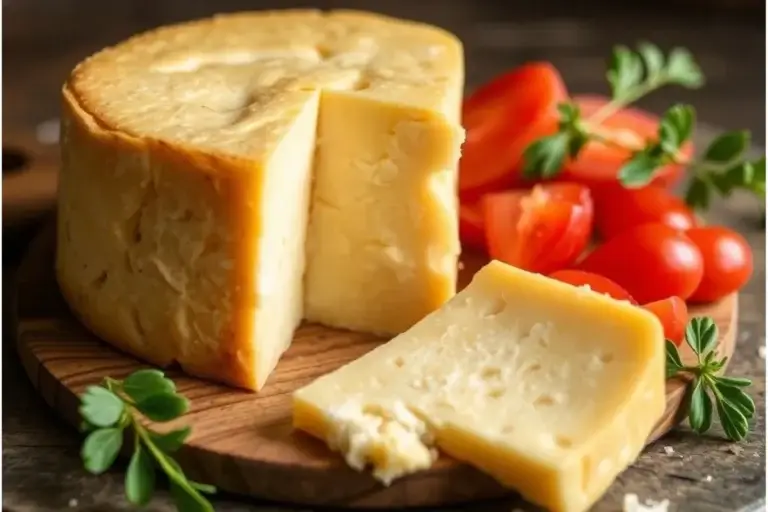

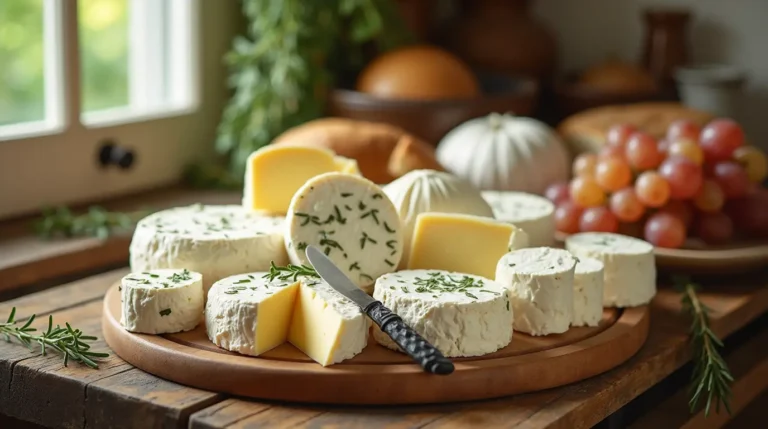
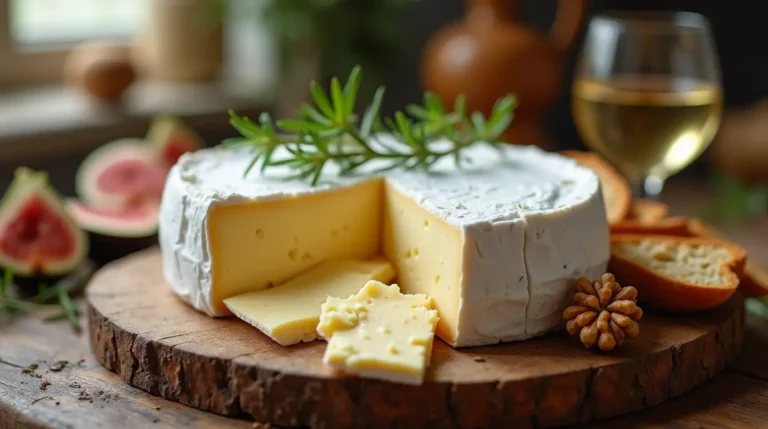
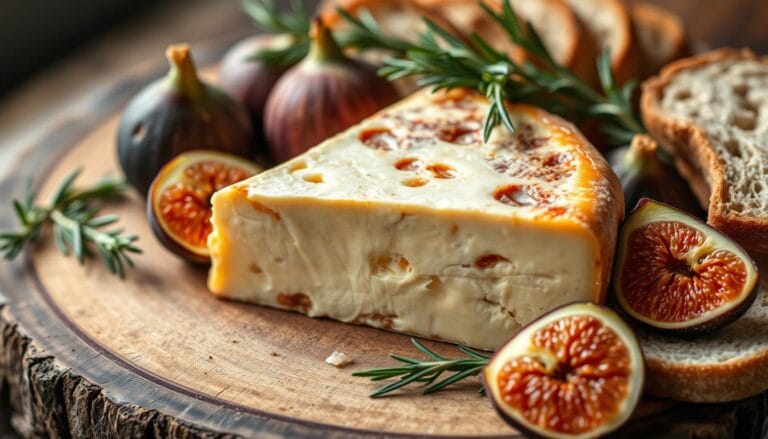
4 Comments
Comments are closed.